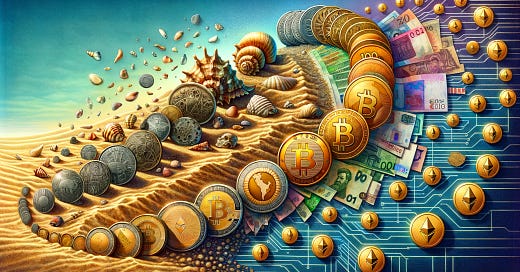Principles of Market Fundamentalism, No. 4: Money
Money is what we say it is, though under certain conditions that must hold.
Editor’s Note: We are standing at a set of forking paths. We can either go in the direction of hard, decentralized money such as Bitcoin. Or we can give the managerial regime complete financial power over us in the form of central bank digital currencies (CBDCs). A third path might be a brutal return to non-digital options such as barter, but that would flow from dystopian collapse, not mass adoption. If you don’t know what CBDCs are, then you had better do your homework. This is the next front in the war against you. The powerful will do everything they can to keep you trapped in the fiat currency matrix.
Principle Four
Anything that serves as a medium of exchange, unit of account, and store of value is money, primarily, though money can include myriad secondary properties.
Another inconvenient truth is that, under most circumstances, a double coincidence of wants is nigh impossible to find. Villagers can barter, of course, but that severely limits the range of wants and needs a given villager can satisfy. The ancients solved this problem long ago with the introduction of money.
The principle is that money has specific properties that make it useful as a medium of exchange, a unit of account, and a store of value. Ancient peoples used seashells and shiny stones before using precious metals or banknotes. Indeed, money has historically been an emergent phenomenon, which is hard for some people to appreciate.
In other words, no one planned or designed the use of money any more than they planned or designed the language they use to communicate.
It was only when powerful authorities realized they could extend their power by issuing fiat currencies, where fiat means I deem it so. The Romans used precious metals, for example. Still, the Emperors found that each time a coin passed through the treasury, they could adulterate the metal, re-mint it, and return it to circulation, having taken some amount of gold, say, out of the nummus aureus for themselves. Roman authorities debased the currency through the centuries, causing persistent inflation.
Despite technocratic fever dreams, inflation is a tax that is, on aggregate, harmful to the many, including—and especially—the poor. Today, central banks don’t debase coins. They print more notes or add more zeroes.
There are nine distinct properties of money that, in most circumstances, one might like to instantiate in a given currency:
Scarcity,
Durability,
Portability,
Divisibility,
Recognizability,
Ease of storage,
Fungibility,
Difficulty counterfeiting, and
Usage.
With the introduction of cryptocurrencies, though, innovators imagine all manner of other properties that might be useful in various contexts, such as stability. Let them compete.
These new currencies and their associated secondary properties show us that there is no One True Money but myriad monies that give us the properties we need in various circumstances according to our subjective valuations of their utility.
One great benefit of these innovations is that decentralized digital currencies are difficult, if not impossible, to debase or control. We can look forward to an era in which our monies become far less corruptible by central banks and their coterie of supplicants, which we affectionately call Wall Street.
Happily, the functions Wall Street once served might soon be served by energy and code.






I'm less excited about cryptocurrencies than you are. What happens when SHTF and you can't get online? What happens if some bug is lurking in the code which allows a clever hacker to generate unlimited coins? I've worked as a professional programmer and have seen many bugs pop out that had been missed for long periods of time. Maybe Bitcoin and others are bulletproof and maybe we won't experience SHTF, but I would not choose to put any of my wealth, such as it is, there.